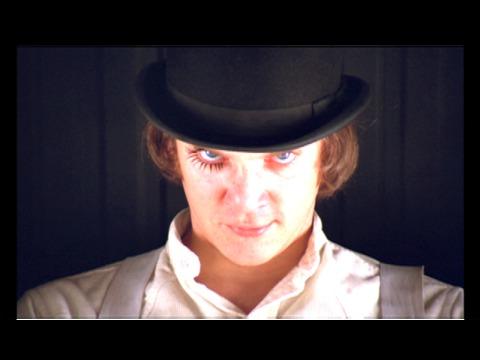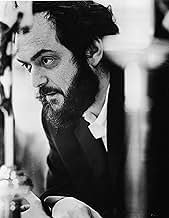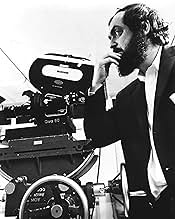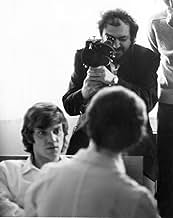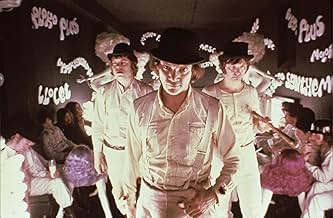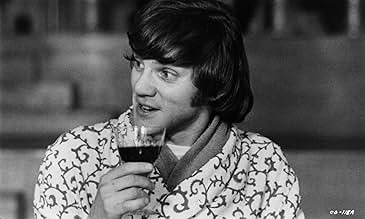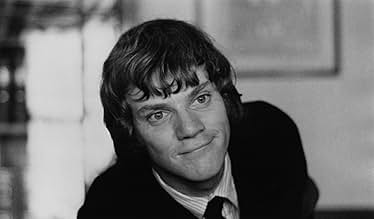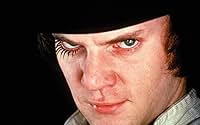Im Großbritannien der Zukunft sitzt der charismatische Delinquent Alex DeLarge im Gefängnis. Er meldet sich freiwillig für eine experimentelle Aversionstherapie, die von der Regierung zur Lö... Alles lesenIm Großbritannien der Zukunft sitzt der charismatische Delinquent Alex DeLarge im Gefängnis. Er meldet sich freiwillig für eine experimentelle Aversionstherapie, die von der Regierung zur Lösung des Kriminalitätsproblems entwickelt wurde - aber es läuft nicht alles nach Plan.Im Großbritannien der Zukunft sitzt der charismatische Delinquent Alex DeLarge im Gefängnis. Er meldet sich freiwillig für eine experimentelle Aversionstherapie, die von der Regierung zur Lösung des Kriminalitätsproblems entwickelt wurde - aber es läuft nicht alles nach Plan.
- Regie
- Drehbuch
- Hauptbesetzung
- Für 4 Oscars nominiert
- 12 Gewinne & 26 Nominierungen insgesamt
Zusammenfassung
Empfohlene Bewertungen
The film became infamous for its depiction of violence and sex. It overlooked the fact that despite its initial scenes of brutality and rape, in its heart it is a dark comedy set in a futuristic Dystopian Britain.
An adaptation of Anthony Burgess novel, Malcolm McDowell might be a shade too old to play the teenage delinquent Alex getting high on milk-plus which is infused with drugs and then partakes in an orgy of ultra-violence which includes beating up a vagrant, fighting with a rival gang and then speeding through the country roads where they burst into the house of a writer who gets beaten up and watches his wife get raped as Alex sings Singin in the rain.
We know Alex is still at school as he lives in his parents flat and is visited the next morning by his probation officer who is concerned about his absence from school.
However Alex's luck runs out. He falls out with his fellow gang members and when he breaks into another house, he kills a woman with a phallic sculpture, betrayed by his gang and caught by the police, he is sentenced to 14 years in jail.
The opening part of the film would had been deemed shocking in early 1970s Britain. I doubt that level of sex and savagery would had ever been seen before in a mainstream British film.
However the film becomes more of a surreal prison film once Alex ends up in jail where he joins a church group and tries to fend off advances from fellow inmates. A visiting government minister offers him a chance to take part in an experiment. Once he undertakes an experimental aversion therapy for rehabilitating criminals within two weeks the film becomes a black revenge comedy.
Once freed from prison and rehabilitated Alex finds there is no room for him in his parents home, he gets set upon by a gang of vagrants as the tramp who he beat up in the beginning recognises Alex. His old gang members are now in the police and they torture him. Worse still he stumbles into the house of the writer who he attacked and he gets his vengeance as well. Poor Alex now cannot listen to his favourite piece of Beethoven without doing harm to himself.
There is an underlying political satire of a government wanting to tackle violence in society by being draconian themselves until public opinion turns against them.
The film contains a lot of slang derived from east European languages and although I mentioned he looked rather old to play the teenage Alex, Malcolm McDowell delivers an amazing performance providing a narrative with his Yorkshire tones.
The film might put off some of its audience with its disturbing opening but settles in well after that.
This is almost experimental in its examination of sex and violence in society. It is an unique surreal film. The ideas behind it may be lost to people who sees this simply as an artistic violent movie. No matter how one dissects this, Malcolm McDowell's performance is beyond reproach. He shows his great acting abilities.
While the film's depictions of violence and sex are what it's most known for, ACO works on far deeper levels. The disturbing portrayal of youth and its satirical depiction of a government's attempts to create a better society are brilliant, but the most fascinating aspect of ACO is the questions it poses about good and evil. While the crimes Alex commits at the beginning of the film are atrocious, what the government does to him is worse. The film presents the absolute worst aspects of man, but shows that even these are still favorable to a man without the choice. People can denounce the film because of its brutal content, but the importance of the questions it poses can't be denied.
Equally excellent to the film's content is the effort by the crew. Kubrick's perfectionism pays off well, as ACO in one of his most visually striking films. Malcolm MacDowell is nothing short of amazing as Alex. Kubrick's use of surreal imagery and set pieces, as well as the ingenious use of music to compliment the on-screen action, creates a world that perfectly reflects the protagonist's behavior and the government's policies.
A Clockwork Orange is by no means an easy film to get through, as many will be turned off by the scenes of violence and rape. But this masterpiece is far more complex than a simple romp through a world of youthful violence. It's a rare example of film-making that demands that the viewer actually think. Real horrorshow all around, Oh my brothers.
Director's Trademarks: A Guide to Stanley Kubrick's Films
Director's Trademarks: A Guide to Stanley Kubrick's Films
Wusstest du schon
- WissenswertesMalcolm McDowell's eyes were anesthetized for the torture scenes so that he would film for periods of time without too much discomfort. Nevertheless his corneas got repeatedly scratched by the metal lid locks.
- PatzerMany of the continuity errors are not in fact errors. Stanley Kubrick purposely included many continuity errors as a way of creating a feeling of disorientation for the audience. That is why people's positions change, props are reorganized, and hats (and other articles of clothing) appear and disappear.
- Crazy CreditsThere are no opening credits after the title, which is followed by the opening shot of Alex the Droog. Although it is now commonplace for major films to not have opening credits, in 1971 it was considered rather unusual and was considered a trademark of director Stanley Kubrick.
- Alternative VersionenIn 1973, a new version of "A Clockwork Orange" was released to theaters with an MPAA rating of "R", replacing the previous "X". The new version contained approximately 31 seconds of replacement, less lascivious footage for two scenes: the high speed (2 fps) orgy in Alex's bedroom, and the Ludovico rape scene. The bedroom scene was made more comical by having one of the girls fall off the bed and Alex joins her down there. The Ludovico rape scene was altered in that the scenes with the first two droogs was from the side and waist-up, so it is less explicit. The third droog was removed completely and replaced with a close-up of one of the doctor's face as they are watching Alex's treatment.
- VerbindungenEdited from Triumph des Willens (1935)
- SoundtracksSymphony No.9 in D Minor, Opus 125 Choral: II. Scherzo. Molto vivace
Written by Ludwig van Beethoven
Recorded by Deutsche Grammophon Gesellschaft
Top-Auswahl
Details
- Erscheinungsdatum
- Herkunftsländer
- Sprache
- Auch bekannt als
- Clockwork Orange
- Drehorte
- Binsey Walk, Southmere Lake, Thamesmead South, London, England, Vereinigtes Königreich(Alex puts Dim in water - houses demolished)
- Produktionsfirmen
- Weitere beteiligte Unternehmen bei IMDbPro anzeigen
Box Office
- Budget
- 2.200.000 $ (geschätzt)
- Bruttoertrag in den USA und Kanada
- 26.617.553 $
- Weltweiter Bruttoertrag
- 27.034.887 $
- Laufzeit2 Stunden 16 Minuten
- Farbe
- Sound-Mix
- Seitenverhältnis
- 1.66 : 1
Zu dieser Seite beitragen


